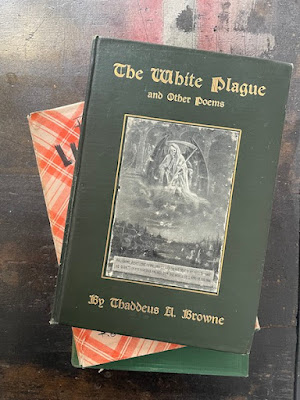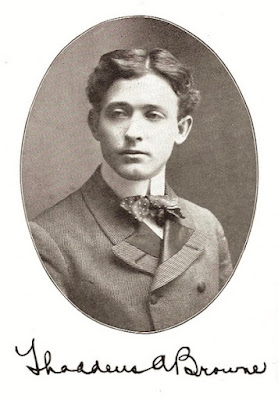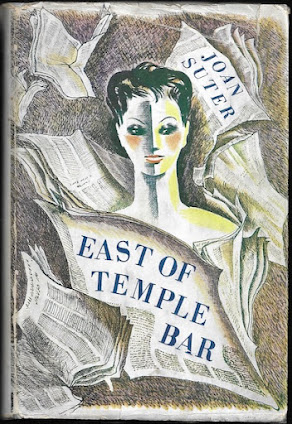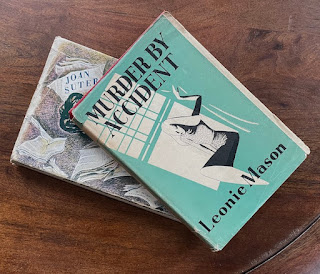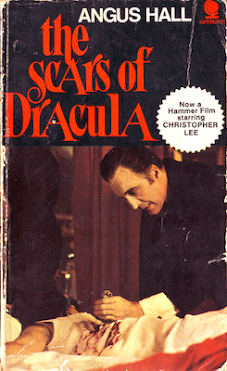10 April 2022
Ten Poems for National Poetry Month, Number 4: 'You' by Ram Spudd Stephen Leacock
For the month, the fourth of ten poems
I find interesting, amusing, and/or infuriating.
Verse from Ram Spudd, "one of nature's gentlemen," as celebrated in Stephen Leacock's Moonbeams from the Larger Lunacy (Toronto: Gundy, 1915).
YOU
You!
With your warm, full, rich, red, ripe lips,
And your beautifully manicured finger-tips!
You!
With your heaving, panting, rapidly expanding and
contracting chest,
Lying against my perfectly ordinary shirt-front and
dinner-jacket vest.
It is too much
Your touch
As such.
It and
Your hand,
Can you not understand?
Last night an ostrich feather from your fragrant hair
Unnoticed fell.
I guard it
Well.
Yestere’en
From your tiara I have slid,
Unseen,
A single diamond,
And I keep it
Hid.
Last night you left inside the vestibule upon the sill
A quarter dollar,
And I have it
Still.
Related post:
Labels:
Leacock,
National Poetry Month,
Poetry,
S.B. Gundy
07 April 2022
Ten Poems for National Poetry Month, Number 3: 'My Little Suffragette' by Thaddeus A. Browne
For the month, the third of ten poems
I find interesting, amusing, and/or infuriating.
Thaddeus A. Browne had a decades-long career as an Ottawa civil servant, though his Citizen obituary (9 March 1935) makes more about his standing as a literary figure.
I'm not sure that Browne was a widely known as a writer of poems and prose; I'd never encountered his name before buying The White Plague and Other Poems (Toronto: William Briggs, 1909). Of its twenty-two poems, 'My Little Suffragette' is the second to take on soldiers in petticoats.
MY LITTLE SUFFRAGETTE
Little blue-eyed suffragette,
What for suffrage calling yet?
Stop your worry, cease your fret,
Don't you see the harm it brings?
If a vote were given you,
Many things no doubt you'd do,You might mould the world anewAs upon its course it swings.
But I want to tell you this,Winsome little suffrage miss,You are keeping me from blissBy your interest in such things.
You have worried my poor mind,You have been to me unkind;Good it is that Love is blind,Or he might have taken wings.
What! you did it just to tease!Little minx, give me a squeeze.Love you give me ecstasiesWhat's your choice of wedding rings?
Remarkably, the poet did marry... though not until middle age.
Thaddeus Augustine Browne
1878-1935
RIP
1878-1935
RIP
Labels:
Browne,
National Poetry Month,
Ottawa Citizen,
Poetry,
William Briggs
04 April 2022
Ten Poems for National Poetry Month, Number 2: 'The Tame Apes' by Robert E. Swanson
For the month, the second of ten poems
I find interesting, amusing, and/or infuriating.
Verse from Robert E. Swanson's Rhymes of a Lumberjack (Toronto: Thomas Allen, 1943). The accompanying illustration is by Bert Bushell.
Not the sort of thing I expected from the publisher of "Poet Laureate of the Home" Edna Jaques.
THE TAME APES
Tame apes of the jungle they call us,
He-men of the forest are we;
Who spend our money on poker and booze,
And don't give a damn if we win or lose.
And a carefree life in the forest we choose,
On the slopes by the Western Sea.
We live a tough life when we're working,
We play just as rough in the town;
We're suckers for women who wear high heels,
With well-moulded bodies and looser ideals,
That trip down the street, dolled up in their seals;
Just waiting for us to come down.
We paint the town red when we're spending.
It's drinks on the house by the crock.
Then our friends are many, and women smile.
It's "What is your hurry? Please tarry a while."
But when she's all spent—we walk the last mile
Down to the Union dock.
Then it's "Give you an upper? The hell you say!
You bums can sleep on the floor!"
The world seems cold, and people will shun.
But a tame-ape brother won't see it undone—
He's still got a crock! ... the son of a gun!
So you step in his stateroom door.
"Say! ... Who's pushing' camp up at Kelley's?
They tell me you're running full slam.
Now the air is blue with cigarette smoke—
Someone is trying to tell you a joke;
You kinda forget you're going' broke
To the jungles: but who gives a damn?
So back to the jungles you're headin' once more—
To the brush where the tame-apes roam;
To the little old camp, by a railroad track,
Where the blue smoke curls from the bull cook's shack,
And the smell of the bunkhouse welcomes you back.
By Gawd! but you soon feel at home.
And before the dawn breaks in the morning,
From his bunk the tame-ape will roll.
While still it is dark, he heads for the brush;
When the push-ape hollers, he'll scramble and rush—
Get down on his knees, in the cold damp slush,
And scratch for his choker hole.
Soon the hooker will holler for the straw-line;
Then the apes in the brush don mad.
One runs with the end up the hill, sheer;
When he hollers out "Line!" you get in the clear,
And bound over logs and chunks like a deer;
If you're slow ... well, it's just too bad.
Then you think of the stake thhat you squandered.
And the plans that you conjured before;
So you make them again, in the very same way—
You'll head into town with your heard-earned pay;
But you know in your heart you'll be king for a day,
Then come back to the woods once more.
But life to a woodman is freedom,
Not measured in dollars sublime;
But to come and go and quit when he please,
Not beg for a job on bended knees.
No roadie to tycoons, with rich properties,
Who would see him in Hell—for a dime.
Labels:
Bushell,
National Poetry Month,
Poetry,
Swanson,
Thomas Allen
01 April 2022
Ten Poems for National Poetry Month, Number 1: 'Snow in April' by Marjorie Pickthall
I haven't given National Poetry Month the attention it deserves. The first year of the Dusty Bookcase saw James MacRae, he of William Arthur Deacon's The Four Jameses, recognized. The following April, National Poetry Month was pretty much given over to fellow James, Cheese Poet James McIntyre. The year after that, I produced a chapbook and promoted an evening celebrating the first James – by which I mean MacRae (né John J MacDonald) – in beautiful St Marys, the small Ontario town he'd chosen to call home.
National Poetry Month month has received little recognition since. I aim to make amends by posting verse – one poem every three days – until the cruelest month runs its course. Some I like, some I very much dislike; all are shared for no other reason than I find them amusing, interesting and/or infuriating.
We begin with 'Snow in April' by once-celebrated, now neglected Marjorie Pickthall. It isn't one of her best, but I like it. So, now that April's here, from The Complete Poems of Marjorie Pickthall (Toronto: McClelland & Stewart, 1927):
SNOW IN APRIL
Over the boughs that the wind has shaken,Over the sands that are rippled with rain,Over the banks where the buds awakenCold cloud shadows are spreading again.All the musical world is still,When sharp and sudden, a sparrow calls,And down on the grass where the violets shiver,Through the spruce on the height of the hill,Down on the breadths of the shining riverThe faint snow falls.Last weak word of a lord that passes—Why should the burgeoning woods be mute?Spring is abroad in the spiring grassesLife is awake in the robin's flute.But high in the spruce a wind is wailing,And the birds in silence arise and go.Is it that winter is still too nearFor the heart of the world to cast out fear,When over the sky the rack comes sailingAnd suddenly falls the snow?
Related posts:
21 March 2022
Joan Suter, Angus Hall, and the Collector in Me
I've got several paying projects on the go, all with tight deadlines, meaning there won't be any reviews here for the next month or so. Something to do with feeding the family, you understand.
However, I did want to share a few things about one of those paying projects: a review of Joan Suter's novel East of Temple Bar for my column in Canadian Notes & Queries.
Until this year, Joan Suter's name meant nothing to me; I encountered it while researching Joan Walker, whose 1957 novel Repent at Leisure I reviewed here in January. Not much has been written about Walker or her career; most of what has, jacket copy included, refers to Repent at Leisure as a debut novel.
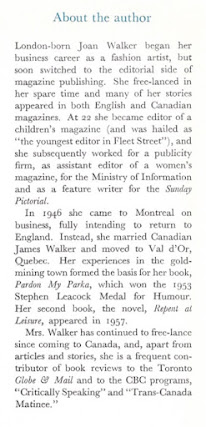 |
| Marriage of Harlequin Joan Walker Toronto: McClelland & Stewart, 1962 |
I have Daryn Wright and Karyn Huenemann to thank for setting me straight. Their Joan Walker entry at Canada's Early Women Writers brings the revelation that Repent at Leisure wasn't the author's first novel, or even the second, but the third. Published in 1946 under her maiden name, East of Temple Bar was Walker's true debut. The same year saw her follow-up, Murder by Accident, which appeared under the pseudonym "Leonie Mason."
Copies of East of Temple Bar aren't plentiful, but they are inexpensive. I wanted the dust jacket, so and splurged all of £7.50 on mine. Money well spent, it brought this front flap:
East of Temple Bar was published in London by C & J Temple. A fragile pale green hardcover with thin pages, its worthy of study by those interested in supply constraints faced by printers in post-war England. My copy, purchased online from London's Small Library Company, once belonged to British novelist Angus Hall (1932-2009). As he would have been thirteen or fourteen when it was published, I'm guessing Hall bought it used when he was a young Fleet Street journalist.
East of Temple Bar revolves around Eve Smith and Hugh Fenwick, two friends who meet while working on Fleet Street. Like Hugh, Angus Hall became a film and theatre critic. Like Eve, he eventually left Fleet Street for a life as a novelist.
Hall's first novel, Love in Smoky Regions, was published in 1962 by Constable. It appears to have been very well-received; just look at the TLS quote on the cover of this paperback edition:
The High-Bouncing Lover (Hammond, 1966) was his second novel. Apparently, it's about a failed writer. I can't help but note that The High-Bouncing Lover was one of the working titles for The Great Gatsby, Fitzgerald's first commercial failure.
By the time the 'seventies hit, Hall had made a reputation for himself as a horror writer. His 1969 novel Devilday was adapted to the screen as Madhouse (1974), starring Vincent Price.
And then there's this, which may frighten some readers:
I count sixteen titles in total, though it's hard to say for certain. Sadly, like Joan Walker (née Suter), Angus Hall is more or less forgotten. What remains of his personal library now rests with the Small Library Company. How it ended up there is an interesting story, told through this Abebooks podcast. One of the Company'a goals is "to find good homes for the books."
Angus Hall's copy of East of Temple Bar has found a good home on my Upper Canadian bookshelves. My only disappointment is that he didn't write his name in it.
Related posts:
Subscribe to:
Comments (Atom)


